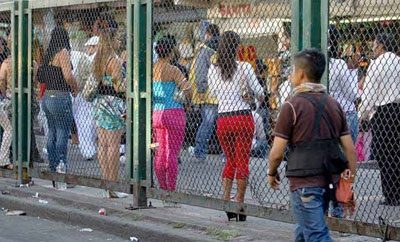Sex trafficking is increasing in Mexico and the victims are getting younger, according to a coalition of NGOs, as the diversification of organized crime fuels modern-day slavery.
Teresa Ulloa, regional head of the Coalition Against Trafficking of Women and Girls in Latin America and the Caribbean (CATW-LAC), told El Universal that 70 percent of the sex trafficking cases seen by her organization each year were linked to drug gangs. Women were often tricked into the trade or taken by force, and one in twenty was murdered, she said.
In July, Ulloa told the Guardian Mexican drug cartels made $10 billion last year from the enforced sexual exploitation and enslavement of thousands of women and girls.
According to the El Universal report, the Mexican government has failed to effectively combat the trade, in which forced prostitutes are even brought into prisons to entertain jailed drug bosses.
The Foundation of Social Assistance and Humanitarian Aid (ASAHAC), another Mexican NGO, estimates that more than half of Central American migrants on their way to the United States end up as victims of some form of trafficking, reported the Guardian.
Mexico’s National Human Rights Commission (CNDH) has estimated there are between 16,000 and 20,000 victims of sexual exploitation in Mexico, said El Universal.
InSight Crime Analysis
Human trafficking and forced prostitution have afflicted Mexico for decades, but the growing involvement of cartels in the trade has developed in recent years. While in part this could be driven by increasing competitiveness reducing profits within the drug trade and forcing organized crime to diversify, it may also be inspired by the territory-based business model introduced by the Zetas.
SEE ALSO: Zetas News and Profile
Since their emergence first as the armed wing of the Gulf Cartel and later as an operation in their own right, the Zetas have emphasized territorial control rather than simply overseeing illegal operations. This means controlling key trafficking corridors and settlements along them, and involves taxing criminal activity within their territory. With all contraband shipments, including of people, utilizing many of the same trafficking routes, it is perhaps a natural evolution of this tactic that has increased cartel involvement in human trafficking.
It may also simply be a matter of profits. As sources explained to Time and the Guardian, while a drug shipment can be bought and sold a finite number of times, a person can be sold again and again, making sex trafficking extremely lucrative.

